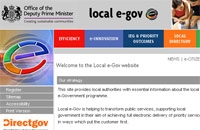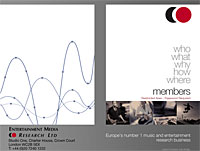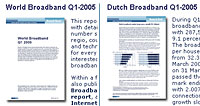 eGov Monitor is reporting that pressure is building for a national campaign to spur demand for eGovernment, with the government likely to be asked to fund a large-scale marketing campaign to promote online public services.
eGov Monitor is reporting that pressure is building for a national campaign to spur demand for eGovernment, with the government likely to be asked to fund a large-scale marketing campaign to promote online public services.
According to the article, only around 15 per cent of the public are presently using eGovernment services, a figure so rubbish that senior officials are banging tables and demanding something should be done.
After three tables collapsed under the strain of their repetitive beats, the top brass have arrived at the conclusion that to boost the current low levels of take-up, the Government must dish out the dosh to a dedicated marketing drive for e-services.
However, recent research funded by the government revealed that although marketing campaigns can effectively promote public awareness of eGovernment services, they don’t always result in actual take-up increasing.
The same research, produced for the e-Citizen National Project on Take-Up and Marketing, came up with the more encouraging news that 46 per cent of adults in England are willing to use online public services.
 Although growth in the take-up of some e-services has been promising, the eGov article states that the need to drive up public usage across the board remains a major concern for the UK’s eGovernment programme.
Although growth in the take-up of some e-services has been promising, the eGov article states that the need to drive up public usage across the board remains a major concern for the UK’s eGovernment programme.
Earlier this month an official from the Office of the Deputy Prime Minister reportedly gave an eGovernment conference in Washington, DC, mulling and musing over a possible UK e-Government marketing campaign.
Winning friends and influencing people with every word, Julian “The Diplomat” Bowrey, the ODPM’s local eGovernment divisional and programme manager, is reported to have told delegates to target the campaign at two key groups of potential users.
The first was “grumpy young men who want to pay their parking fines online and want to complain, preferably at three in the morning” and the second was “women who have an interest in local community services”.
Hmmm. Maybe we can think of some other reasons why take-up has been slow.
Government Faces Call for E-Service Take-Up Drive
Local e-Gov site
 It’s not yet confirmed, but it appears that Google is preparing to challenge PayPal with its own online electronic payment system, rumoured to be called ‘Google Wallet’.
It’s not yet confirmed, but it appears that Google is preparing to challenge PayPal with its own online electronic payment system, rumoured to be called ‘Google Wallet’. Sellers who run auctions on eBay are major buyers of Google’s ads, which appear alongside search results, so it’s not surprising to see the company angling in for a slice of the payment action.
Sellers who run auctions on eBay are major buyers of Google’s ads, which appear alongside search results, so it’s not surprising to see the company angling in for a slice of the payment action. According to a survey by Entertainment Media Research, UK legal digital music downloads have grown by a thumping great 75% in a year.
According to a survey by Entertainment Media Research, UK legal digital music downloads have grown by a thumping great 75% in a year. These findings are supported by the news that legal digital downloads have accounted for 8% of Coldplay’s recent album sales in the US – the biggest share for any new release to date.
These findings are supported by the news that legal digital downloads have accounted for 8% of Coldplay’s recent album sales in the US – the biggest share for any new release to date. Two fifths of those surveyed preferred digital downloads because they were only interested in one or two tracks, while 29% downloaded music to sample an album before purchase.
Two fifths of those surveyed preferred digital downloads because they were only interested in one or two tracks, while 29% downloaded music to sample an album before purchase. Apple and the Sundance Channel have signed a deal that will make content from the cable network exclusively available as podcast downloads from the Apple iTunes Web site next month, according to AdAge.
Apple and the Sundance Channel have signed a deal that will make content from the cable network exclusively available as podcast downloads from the Apple iTunes Web site next month, according to AdAge. One of the first iTunes podcast features scheduled for download from the Sundance Channel will be The Al Franken Show who is, apparently, an Air America talk show host.
One of the first iTunes podcast features scheduled for download from the Sundance Channel will be The Al Franken Show who is, apparently, an Air America talk show host. The feature in AdAge also reports that Sundance will receive Apple’s post-production editing equipment and expertise as part of the barter deal, with the two companies likely to collaborate on the Apple retail level in the future.
The feature in AdAge also reports that Sundance will receive Apple’s post-production editing equipment and expertise as part of the barter deal, with the two companies likely to collaborate on the Apple retail level in the future. 1. Ofcom have produced more original thinking than I gave them credit for, initially, perhaps because the introduction and summary to the document are not as robust as its contents. Read on…
1. Ofcom have produced more original thinking than I gave them credit for, initially, perhaps because the introduction and summary to the document are not as robust as its contents. Read on… This reflects the EU rules governing the use of State Aid, which require that publicly funded services such as the BBC’s must complement rather than substitute or duplicate provision by the market. Furthermore, where market developments supersede publicly funded provision, the BBC should withdraw from those services or activities and re-direct its valuable public resources to areas of activity where there is a proven market failure. While market failure should not be the only test applied to BBC services, it should provide the underpinning for all publicly funded BBC services. The absence of a market failure analysis raises significant questions as to the compatibility of the BBC’s publicly funded status with European State Aid rules.
This reflects the EU rules governing the use of State Aid, which require that publicly funded services such as the BBC’s must complement rather than substitute or duplicate provision by the market. Furthermore, where market developments supersede publicly funded provision, the BBC should withdraw from those services or activities and re-direct its valuable public resources to areas of activity where there is a proven market failure. While market failure should not be the only test applied to BBC services, it should provide the underpinning for all publicly funded BBC services. The absence of a market failure analysis raises significant questions as to the compatibility of the BBC’s publicly funded status with European State Aid rules. Animated UK act, Gorillaz, are proudly claiming a world first for their ‘next generation’ enhanced video for ‘Feel Good Inc.’
Animated UK act, Gorillaz, are proudly claiming a world first for their ‘next generation’ enhanced video for ‘Feel Good Inc.’ Bundling in a host of interactive freebies is clearly being seen as a useful marketing tool for record companies, keen to discover new ways to part loyal fans with their cash.
Bundling in a host of interactive freebies is clearly being seen as a useful marketing tool for record companies, keen to discover new ways to part loyal fans with their cash. The band – brainchild of Blur’s Damon Albarn (aka 2D) and Tank Girl” creator Jamie Hewlett (aka Murdoc) – are already celebrating the US success of their second album, “Demon Days,” which has debuted at No. 6 on The Billboard 200.
The band – brainchild of Blur’s Damon Albarn (aka 2D) and Tank Girl” creator Jamie Hewlett (aka Murdoc) – are already celebrating the US success of their second album, “Demon Days,” which has debuted at No. 6 on The Billboard 200. A new survey published today reveals that more Europeans than Americans possessed a broadband Internet connection in the first quarter of 2005, with hi-tech South Korea in danger of losing its global pole position.
A new survey published today reveals that more Europeans than Americans possessed a broadband Internet connection in the first quarter of 2005, with hi-tech South Korea in danger of losing its global pole position. “Given the slow growth of South Korea, we expect that the top position, now held by South Korea, will change hands this year,” observed TelecomPaper director Ed Achterberg.
“Given the slow growth of South Korea, we expect that the top position, now held by South Korea, will change hands this year,” observed TelecomPaper director Ed Achterberg. An unemployed Scottish man alleged to have carried out “the biggest military computer hack of all time” will appear in a London court today.
An unemployed Scottish man alleged to have carried out “the biggest military computer hack of all time” will appear in a London court today. NTL’s claim that 300K broadband offer was “more than 5 times faster than standard 56K dial-up internet” has been happy-slapped down by the Advertising Standards Authority (ASA), who condemned it as being in breach of TV Advertising Standards Code.
NTL’s claim that 300K broadband offer was “more than 5 times faster than standard 56K dial-up internet” has been happy-slapped down by the Advertising Standards Authority (ASA), who condemned it as being in breach of TV Advertising Standards Code. The telecoms giant insisted that it was standard industry practice to refer to the speed of broadband only in terms of download speed and, to back up their case, readily snitched on a host of competitors making similar claims.
The telecoms giant insisted that it was standard industry practice to refer to the speed of broadband only in terms of download speed and, to back up their case, readily snitched on a host of competitors making similar claims. After an eternity of “will they? won’t they?” rumours Siemens has announced that it is to flog its loss-making mobile-phones unit to the Taiwan-based BenQ Group.
After an eternity of “will they? won’t they?” rumours Siemens has announced that it is to flog its loss-making mobile-phones unit to the Taiwan-based BenQ Group. Through the haze of a soft focus lens, Klaus Kleinfeld, the CEO of Siemens AG whispered sweet nothings about his new bedfellow:
Through the haze of a soft focus lens, Klaus Kleinfeld, the CEO of Siemens AG whispered sweet nothings about his new bedfellow: Perhaps a little tipsy from wielding his fearsome buying power, BenQ Chairman & CEO K.Y. Lee roared “With the acquisition of Siemens’s mobile phones business, we are rapidly approaching our goal to become one of the world’s leading players in the mobile phone industry. Our expansion strategy will be strongly supported by this deal, as we can rely on a global organization with excellent employees, a well-established blue-chip customer base in the mobile business and a strong brand with high impact.”
Perhaps a little tipsy from wielding his fearsome buying power, BenQ Chairman & CEO K.Y. Lee roared “With the acquisition of Siemens’s mobile phones business, we are rapidly approaching our goal to become one of the world’s leading players in the mobile phone industry. Our expansion strategy will be strongly supported by this deal, as we can rely on a global organization with excellent employees, a well-established blue-chip customer base in the mobile business and a strong brand with high impact.” “Siemens will continue to offer its customers in the telecommunications industry one-stop shopping for all their needs. With BenQ, we have found a partner who will supply us with the corresponding products. In addition, we will be collaborating closely in research and development. Moreover, we also intend to utilize synergies in jointly addressing customers and in our selling operations,” commented Lothar Pauly, the CEO of the Siemens Communications Group.
“Siemens will continue to offer its customers in the telecommunications industry one-stop shopping for all their needs. With BenQ, we have found a partner who will supply us with the corresponding products. In addition, we will be collaborating closely in research and development. Moreover, we also intend to utilize synergies in jointly addressing customers and in our selling operations,” commented Lothar Pauly, the CEO of the Siemens Communications Group.